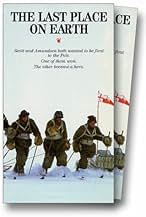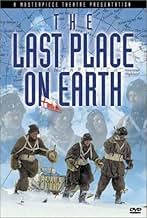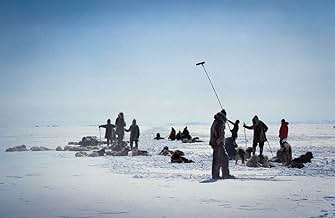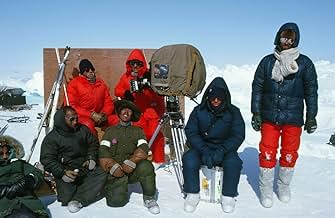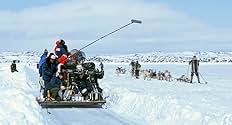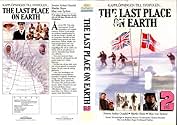VALUTAZIONE IMDb
8,0/10
484
LA TUA VALUTAZIONE
Aggiungi una trama nella tua linguaBased on the book 'Scott and Amundsen' by Roland Huntford, "The Last Place on Earth" is an exploration of the rivalry between Captain Robert F. Scott and Ronald Amundsen as they attempt to r... Leggi tuttoBased on the book 'Scott and Amundsen' by Roland Huntford, "The Last Place on Earth" is an exploration of the rivalry between Captain Robert F. Scott and Ronald Amundsen as they attempt to reach the South Pole.Based on the book 'Scott and Amundsen' by Roland Huntford, "The Last Place on Earth" is an exploration of the rivalry between Captain Robert F. Scott and Ronald Amundsen as they attempt to reach the South Pole.
Sfoglia gli episodi
Recensioni in evidenza
This series was a superb production based on Roland Huntford's book. For many years Scott was portrayed as a hero, who died on his return from the Pole. In Death he overshadowed Amundsen's achievement of being first to the pole. Huntford's book and this production, set out to dispell the legend of Scott the Hero.
The start of the series, gives an insight into the direction the whole production goes. It shows Amundsen staying with Eskimos, while Scott is facing the prospect of a court marshall. There can be little doubt in reality that the British Expedition was no match for the experienced collection of Norwegian Explorers. If it had been a sporting event, it would have been classed as a thrashing. After all Amundsens was halfway back to his base when Scott reached the Pole.
The different ideas of the two men is made clear. Amundsen knows he must be first to the pole. He can't afford to be second. He has told his country and government that he is headed for the north pole. He knows that no chances can be taken in a place as unforgiving as the Antartic. Scott however believes that the pole is his by rights, this is probably due to the mentality of the British at that period of time when they had the largest empire the world had seen. He takes only enough supplies to make it there and back, and when he falls behind schedule he starves to death.
It portrays Scotts rivalry with Shakelton, and why Scott pushed on to the Pole, as he felt he had to do better than Shakelton. For many years Scott was considered the Greater Hero. Nowadays it is reversed with Shakelton's concern for his men, is looked on more favourable, thans Scott's reckless actions to push on to the prize.
For all of Scott's mistakes, the show does not go into the bad luck that Scott suffered at the Hands of the weather. Yes, it does snow in the Antartic all the time, but the temperature in the March that year was well below the average for that time of year. Would Scott had made it back in more favourable conditions, we'll never know, but Amundsen knew it was not a place to take chances.
In summing up, this was a superb production, with good acting, directing and setting. I recommend anyone who enjoyed this to read the book as well. Also to read Scott's diary, as it is a masterpiece. Maybe he was more suited to writing than to exploring.
The start of the series, gives an insight into the direction the whole production goes. It shows Amundsen staying with Eskimos, while Scott is facing the prospect of a court marshall. There can be little doubt in reality that the British Expedition was no match for the experienced collection of Norwegian Explorers. If it had been a sporting event, it would have been classed as a thrashing. After all Amundsens was halfway back to his base when Scott reached the Pole.
The different ideas of the two men is made clear. Amundsen knows he must be first to the pole. He can't afford to be second. He has told his country and government that he is headed for the north pole. He knows that no chances can be taken in a place as unforgiving as the Antartic. Scott however believes that the pole is his by rights, this is probably due to the mentality of the British at that period of time when they had the largest empire the world had seen. He takes only enough supplies to make it there and back, and when he falls behind schedule he starves to death.
It portrays Scotts rivalry with Shakelton, and why Scott pushed on to the Pole, as he felt he had to do better than Shakelton. For many years Scott was considered the Greater Hero. Nowadays it is reversed with Shakelton's concern for his men, is looked on more favourable, thans Scott's reckless actions to push on to the prize.
For all of Scott's mistakes, the show does not go into the bad luck that Scott suffered at the Hands of the weather. Yes, it does snow in the Antartic all the time, but the temperature in the March that year was well below the average for that time of year. Would Scott had made it back in more favourable conditions, we'll never know, but Amundsen knew it was not a place to take chances.
In summing up, this was a superb production, with good acting, directing and setting. I recommend anyone who enjoyed this to read the book as well. Also to read Scott's diary, as it is a masterpiece. Maybe he was more suited to writing than to exploring.
So, here we go again - Scott had it harder than Amundsen, Amundsen was simply doing a "stunt", and so Scott was the more "noble".
If you compare their diaries (and you can now, as Huntford did), Scott stayed in his tent on days when Amundsen and his crew did their fifteen miles (they did fifteen miles a day unless they were completely blizzard-bound - some days in their fur underwear and nothing else). And they had the same weather on nearly the same days. Scott started later, since his teams couldn't travel when it was really cold, so he was out on the land-mass later than Amundsen by nearly a month (which is why he encountered colder temperatures). Scott assumed that changing his headcount from four to five men at the last minute would make no difference in the food supply when they'd very carefully planned exactly how much food they'd need for a four-man team, with no contingency for delays. Amundsen ensured that he'd have at least double the amount of food and fuel he'd need for the whole trip.
As to dogs and ponies - Scott didn't like dogs, because he didn't understand them, either how to work with them, nor how to drive them. The first time he saw dogs being driven properly was on the barrier by Cecil Meares. The scenes where Meares drives past them, and is later found relaxing, waiting for the rest of the teams to arrive are taken verbatim from Scott's and Meares' diaries. Ponies are NOT appropriate for the Antarctic environment, since they have to pull their own food for every mile they're going to walk. Dogs could eat seal and penguin, both of which are native to the Antarctic; they could also eat each other, if necessary.
Amundsen had to trail-blaze an entirely new route, through and over some of the most difficult terrain the Antarctic has to offer. Scott had a map of his route up to the last ninety-seven miles. The Beardmore glacier (Scott's route) is a nice, long, slow climb to the Pole. The Axel Heiberg glacier requires planes flying over it to use their maximum rate of climb; Amundsen and his crew pioneered a route through the ice falls of the Heiberg in less than a week.
And yes, there was a conspiracy to tart up Scott's diaries for public consumption. Scott's widow, Kathleen, worked with J.M. Barrie (of Peter Pan fame) to edit his diaries, making him more of a heroic figure, and cutting out the more disparaging comments Scott made about his companions.
Planning is everything: Scott and his companions died of starvation and scurvy; Amundsen and his crew gained weight on their trip.
I'm not saying that Scott wasn't a brave fellow or that his journey was less than that of Amundsen. I can't imagine man-hauling a 300 lb sledge for hundreds of miles. The tragedy of Scott is that, had he done his research (as Amundsen had), he wouldn't have had to, and he might have beat Amundsen to the pole.
If you compare their diaries (and you can now, as Huntford did), Scott stayed in his tent on days when Amundsen and his crew did their fifteen miles (they did fifteen miles a day unless they were completely blizzard-bound - some days in their fur underwear and nothing else). And they had the same weather on nearly the same days. Scott started later, since his teams couldn't travel when it was really cold, so he was out on the land-mass later than Amundsen by nearly a month (which is why he encountered colder temperatures). Scott assumed that changing his headcount from four to five men at the last minute would make no difference in the food supply when they'd very carefully planned exactly how much food they'd need for a four-man team, with no contingency for delays. Amundsen ensured that he'd have at least double the amount of food and fuel he'd need for the whole trip.
As to dogs and ponies - Scott didn't like dogs, because he didn't understand them, either how to work with them, nor how to drive them. The first time he saw dogs being driven properly was on the barrier by Cecil Meares. The scenes where Meares drives past them, and is later found relaxing, waiting for the rest of the teams to arrive are taken verbatim from Scott's and Meares' diaries. Ponies are NOT appropriate for the Antarctic environment, since they have to pull their own food for every mile they're going to walk. Dogs could eat seal and penguin, both of which are native to the Antarctic; they could also eat each other, if necessary.
Amundsen had to trail-blaze an entirely new route, through and over some of the most difficult terrain the Antarctic has to offer. Scott had a map of his route up to the last ninety-seven miles. The Beardmore glacier (Scott's route) is a nice, long, slow climb to the Pole. The Axel Heiberg glacier requires planes flying over it to use their maximum rate of climb; Amundsen and his crew pioneered a route through the ice falls of the Heiberg in less than a week.
And yes, there was a conspiracy to tart up Scott's diaries for public consumption. Scott's widow, Kathleen, worked with J.M. Barrie (of Peter Pan fame) to edit his diaries, making him more of a heroic figure, and cutting out the more disparaging comments Scott made about his companions.
Planning is everything: Scott and his companions died of starvation and scurvy; Amundsen and his crew gained weight on their trip.
I'm not saying that Scott wasn't a brave fellow or that his journey was less than that of Amundsen. I can't imagine man-hauling a 300 lb sledge for hundreds of miles. The tragedy of Scott is that, had he done his research (as Amundsen had), he wouldn't have had to, and he might have beat Amundsen to the pole.
This is an extremely well-made, well-acted multipart drama about the "race" to the South Pole between Scott and Amundsen, based on a book by Roland Huntford. Huntford's book set out to debunk the myth of Scott of the Antarctic, and now many of his assertions are accepted as blythly as once the legend of Scott was accepted. Unfortunately, many of Huntford's assertions have themselves been debunked, and the book, while taking a critical view of Scott's preparations as compared to Amundsen's, still is interesting with its newfound trivia, is increasingly relegated to a status as an interesting fossil. Also interesting is that the off-screen Shackleton (now famous after the Kenneth Branagh movie) is always treated in the book and "The Last Place on Earth" as a polar savant and a superior force to Scott, actually had many of the same qualities Huntford attributes to Scott -- including inadequate planning -- but Shackleton got all his men home safely; whereas Huntford, and the movie, ascribe a death wish to Scott, which is absolutely undocumented.
Martin Shaw's Scott is irascible, peevish, and stupid, just as Huntford wanted him. He does seize upon good qualities as they come his way, but basically he's a whipped man, sent south from his wife's desire to have a great husband. Perhaps he just wants to go to the South Pole to get away from her.
Amundsen, the man who got to the South Pole first, is treated as a parfait knight in every way. The Norwegian scenes were as well done as the British scenes.
However, the film, in its debunking of the Scott legend, hides some evidence and creates other evidence. For instance, Scott's dislike of using dogs was not a hidebound reflex, but the fact that in an earlier expedition, dogs did not perform adequately. He knew his life would depend on them in the polar region, and his experience told them he could not rely on them. He thought the tractors and Siberian ponies would, however, be good replacements. Unfortunately, the ponies were more useless than the dogs might have been.
Amundseon, however, had problems himself. He never wanted to go south, but wanted the North Pole. Too bad: not one, but two men [both, if you know your history, outrageous liars] claimed the North Pole, Cook and Peary. Cook was a pal of Amundsen's from an earlier expedition where he'd saved many lives as a doctor. Though they were fast friends, Amundsen did not realize or blinded himself to the fact that Cook, when he could not achieve a feat (like climbing Mt. Mckinley) would lie about his achievements shamelessly. He was not only a fraud, he later became a swindler.
As one would expect in a movie like this, Cook is portrayed in a positive light; and he's obviously given North Polar priority, though in fact he never came within a thousand miles of the pole.
Amundsen, finding the glory he sought to the north taken from him by two skilled liars, neither of whom reached the North Pole in fact, decided to take the South Pole, because he was deeply in debt at the time and thought he would make money off it. So, telling the world he was heading north on a scientific expedition, went south instead. Scott, learning about this only when his expedition was on its way, was forced to expedite some of his own arrangements, thereby condemning his own polar party in a race he hadn't expected. And since he arrived at the pole only days after Amundsen, but nevertheless second, spent unnecessary time collecting useless scientific data, and collecting worthless rock samples, trying to ensure his own expedition served science, if nothing else; but he was swindled out of polar priority.
One area where Huntford is dead wrong, and the movie, is his complaints that Scott whined about the weather. In fact, we now know, as Scott could not with his more primitive weather gauging, that the weather was much worse than anyone could've expected; that under normal conditions as were known at the time, Scott's preparations would've been adequate; and it was by luck more than dogs and skis that Amundsen didn't get bogged down and die in the same conditions Scott had.
And Scott proved himself a man of honor, of course, in that Amundsen, perhaps snidely, left a letter for Scott to be taken back in case the Norwegian died; and Scott and his party died lugging home the letter, carefully preserved, that would've presented evidence to the world that Scott reached the pole second, even though at the time, no doubt the world would've taken an Englishman's word if Scott, like Cook and Peary, decided to lie about his achievements.
Unfortunately, the race to the south pole, unlike the race north, involved two basically honorable men, who felt forced by circumstances to chicanery: Amundsen, by lying to the world about the real purpose of his expedition; and Scott, by forcing his men to achieve the pole in an over-hasty way to beat his unexpected competitor.
As it turned out, both men got what they deserved. Scott, though it cost him his life, got the South Polar glory; and Amundsen got priority, though, since he started out his expedition with deception (as Cook and Peary ended their's) earned neither fame nor money, but only his place in history.
As Huntford's book is now seriously undermined in parts (especially in the new finds about the weather, which come from core samples unavailable at the time Huntford decided to undermine Britain's South Polar hero) it would be nice to see a new Scott and Amundsen show in the light of the new evidence, especially with such a fine cast and good production values as this show presented. But as that's not likely, this is the best version of that history you'll find. It was shot in Antarctic conditions, and the cast no doubt suffered.
Just keep in mind that its purpose was a hatchet job on a hero, and that Scott wasn't as bad, nor Amundsen so perfect, as the movie depicts; but both blow Cook and Peary out of the water as men of honor and greatness.
In an ideal world, Amundsen would've gotten credit for priority at the North Pole, which he wanted and deserved; and Scott would've gotten credit for the South Pole, which he deserved -- especially the way he and his men valiantly fought against the unexpected weather conditions with their then state-of-the-art (now primitive) methods. Both men deserved better than they got. And Scott deserves a better show than this. But this is the best polar drama ever, even compared to Branagh's wonderful "Shackleton".
Martin Shaw's Scott is irascible, peevish, and stupid, just as Huntford wanted him. He does seize upon good qualities as they come his way, but basically he's a whipped man, sent south from his wife's desire to have a great husband. Perhaps he just wants to go to the South Pole to get away from her.
Amundsen, the man who got to the South Pole first, is treated as a parfait knight in every way. The Norwegian scenes were as well done as the British scenes.
However, the film, in its debunking of the Scott legend, hides some evidence and creates other evidence. For instance, Scott's dislike of using dogs was not a hidebound reflex, but the fact that in an earlier expedition, dogs did not perform adequately. He knew his life would depend on them in the polar region, and his experience told them he could not rely on them. He thought the tractors and Siberian ponies would, however, be good replacements. Unfortunately, the ponies were more useless than the dogs might have been.
Amundseon, however, had problems himself. He never wanted to go south, but wanted the North Pole. Too bad: not one, but two men [both, if you know your history, outrageous liars] claimed the North Pole, Cook and Peary. Cook was a pal of Amundsen's from an earlier expedition where he'd saved many lives as a doctor. Though they were fast friends, Amundsen did not realize or blinded himself to the fact that Cook, when he could not achieve a feat (like climbing Mt. Mckinley) would lie about his achievements shamelessly. He was not only a fraud, he later became a swindler.
As one would expect in a movie like this, Cook is portrayed in a positive light; and he's obviously given North Polar priority, though in fact he never came within a thousand miles of the pole.
Amundsen, finding the glory he sought to the north taken from him by two skilled liars, neither of whom reached the North Pole in fact, decided to take the South Pole, because he was deeply in debt at the time and thought he would make money off it. So, telling the world he was heading north on a scientific expedition, went south instead. Scott, learning about this only when his expedition was on its way, was forced to expedite some of his own arrangements, thereby condemning his own polar party in a race he hadn't expected. And since he arrived at the pole only days after Amundsen, but nevertheless second, spent unnecessary time collecting useless scientific data, and collecting worthless rock samples, trying to ensure his own expedition served science, if nothing else; but he was swindled out of polar priority.
One area where Huntford is dead wrong, and the movie, is his complaints that Scott whined about the weather. In fact, we now know, as Scott could not with his more primitive weather gauging, that the weather was much worse than anyone could've expected; that under normal conditions as were known at the time, Scott's preparations would've been adequate; and it was by luck more than dogs and skis that Amundsen didn't get bogged down and die in the same conditions Scott had.
And Scott proved himself a man of honor, of course, in that Amundsen, perhaps snidely, left a letter for Scott to be taken back in case the Norwegian died; and Scott and his party died lugging home the letter, carefully preserved, that would've presented evidence to the world that Scott reached the pole second, even though at the time, no doubt the world would've taken an Englishman's word if Scott, like Cook and Peary, decided to lie about his achievements.
Unfortunately, the race to the south pole, unlike the race north, involved two basically honorable men, who felt forced by circumstances to chicanery: Amundsen, by lying to the world about the real purpose of his expedition; and Scott, by forcing his men to achieve the pole in an over-hasty way to beat his unexpected competitor.
As it turned out, both men got what they deserved. Scott, though it cost him his life, got the South Polar glory; and Amundsen got priority, though, since he started out his expedition with deception (as Cook and Peary ended their's) earned neither fame nor money, but only his place in history.
As Huntford's book is now seriously undermined in parts (especially in the new finds about the weather, which come from core samples unavailable at the time Huntford decided to undermine Britain's South Polar hero) it would be nice to see a new Scott and Amundsen show in the light of the new evidence, especially with such a fine cast and good production values as this show presented. But as that's not likely, this is the best version of that history you'll find. It was shot in Antarctic conditions, and the cast no doubt suffered.
Just keep in mind that its purpose was a hatchet job on a hero, and that Scott wasn't as bad, nor Amundsen so perfect, as the movie depicts; but both blow Cook and Peary out of the water as men of honor and greatness.
In an ideal world, Amundsen would've gotten credit for priority at the North Pole, which he wanted and deserved; and Scott would've gotten credit for the South Pole, which he deserved -- especially the way he and his men valiantly fought against the unexpected weather conditions with their then state-of-the-art (now primitive) methods. Both men deserved better than they got. And Scott deserves a better show than this. But this is the best polar drama ever, even compared to Branagh's wonderful "Shackleton".
Let me start out by agreeing with everyone who has previously written: it is the best drama about polar adventure ever made.
The viewer should be very skeptical about the Scott defenders because it is evident their homework is shallowly researched and based on a very limited interpretation of Scott's polar problem: that bad luck and bad weather caused his downfall.
I've read Huntford's book 3 times, read the weather article and seen the PBS episode where the young scientist tried to resurrect Scott as a noble, if unfortunate hero. Also, Huntford and his fellow professionals have posted excellent rebuttals regarding these spurious claims about Scott and the weather.
The questions that should put an end to the argument is this: who would get you through safely and who exhibited a breadth of polar knowledge sufficient to AVOID the problems of travel in the brutal Antarctic?
If you said Scott, then you probably thought the Charge of the Light Brigade was a wonderful jaunt through Russian cannon fire just to show how noble and brave you were. Above all else, don't let these half-informed reviewers go without a serious look into the counter-points made to their weak arguments.
Still, the series is a breath-taking look at the human struggle to survive and to seek glory and the dreadful price it takes in lives and in the judgment of history.
The viewer should be very skeptical about the Scott defenders because it is evident their homework is shallowly researched and based on a very limited interpretation of Scott's polar problem: that bad luck and bad weather caused his downfall.
I've read Huntford's book 3 times, read the weather article and seen the PBS episode where the young scientist tried to resurrect Scott as a noble, if unfortunate hero. Also, Huntford and his fellow professionals have posted excellent rebuttals regarding these spurious claims about Scott and the weather.
The questions that should put an end to the argument is this: who would get you through safely and who exhibited a breadth of polar knowledge sufficient to AVOID the problems of travel in the brutal Antarctic?
If you said Scott, then you probably thought the Charge of the Light Brigade was a wonderful jaunt through Russian cannon fire just to show how noble and brave you were. Above all else, don't let these half-informed reviewers go without a serious look into the counter-points made to their weak arguments.
Still, the series is a breath-taking look at the human struggle to survive and to seek glory and the dreadful price it takes in lives and in the judgment of history.
Still splendid TV but the debate on Scott has moved on. After the glorifying of the early years to buoy up a country stunned by the losses of the Boer War came the debunking by Huntford. Since then there have been many novels questioning his motives, principally by Sir Ranulph Fiennes and Susan Solomon. I have just read David Crane's excellent book which, at last, seems to provide a balanced account of a remarkable man, rooted in Victorian values but with an enquiring and open mind ahead of his time. If your interest is piqued by this film there are books galore on Scott for you to read to explore the debate for yourselves. You can even try to find The Race by Kare Holt "a writer as determined to rubbish Amundsen's reputation as Huntford was to rubbish Scott's". All in all good entertainment, especially for those who love a good anti-English polemic a la Braveheart, but don't confuse this with the truth.
Lo sapevi?
- QuizDirector Ferdinand Fairfax had previously worked with Martin Shaw on the TV series The Professionals (1977-81). Whilst he was unimpressed with Lewis Collins ego on that show, he was impressed by Shaw's acting range and desire to be offered more challenging material. So when he was asked to direct this miniseries he successfully lobbied the producers (who were considering Timothy Dalton among others) to meet Shaw. They too liked him and he was eventually offered the lead role.
- BlooperOn his return from the South Pole at 'Framheim,' Amundsen learns that the credit for reaching the North Pole has been taken away from Dr Frederick Cook and given instead to Peary. In reality, Amundsen was well aware of the controversy *before* his departure for Antarctica, and to avoid any question that he had not reached the true South Pole due to faulty navigation, staked out an area of ten miles around what he believed to be the Pole itself.
I più visti
Accedi per valutare e creare un elenco di titoli salvati per ottenere consigli personalizzati
- How many seasons does The Last Place on Earth have?Powered by Alexa
Dettagli
Contribuisci a questa pagina
Suggerisci una modifica o aggiungi i contenuti mancanti

Divario superiore
By what name was La corsa al Polo (1985) officially released in India in English?
Rispondi
